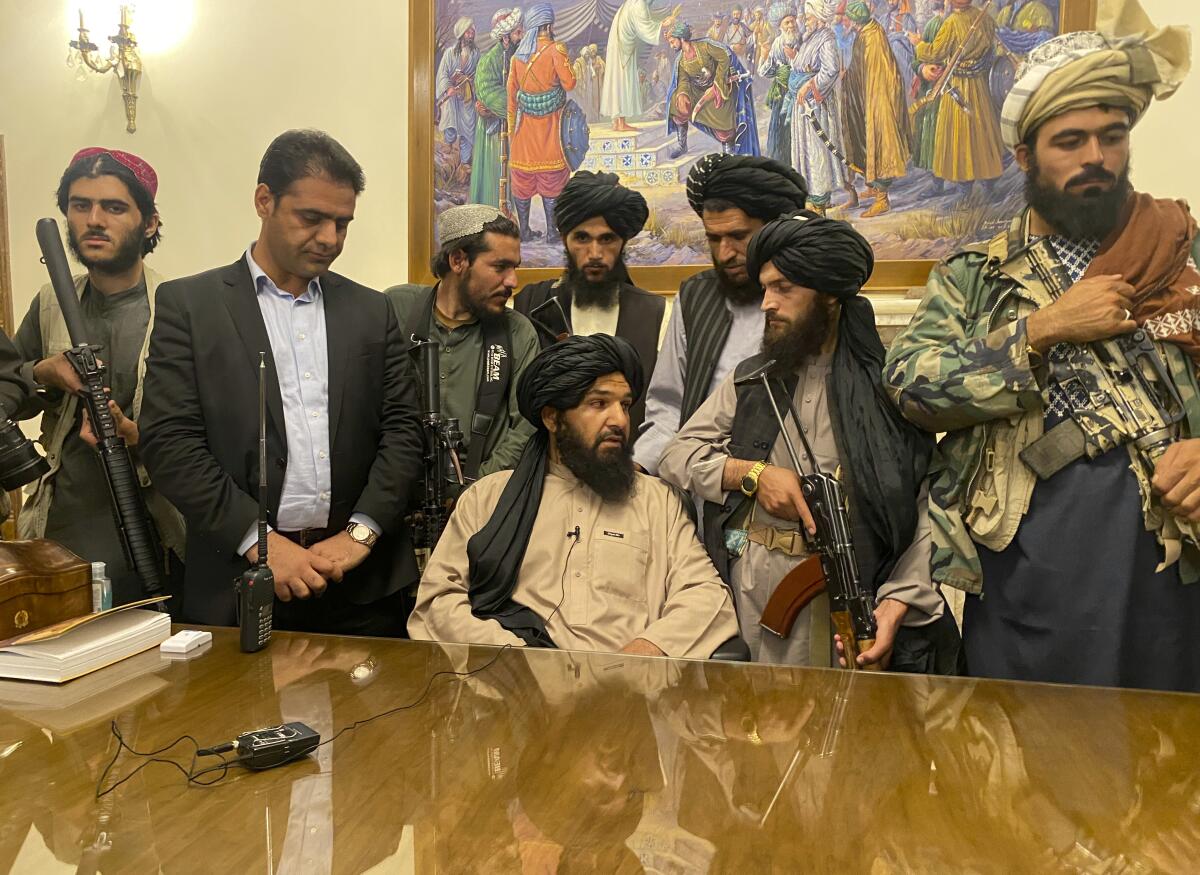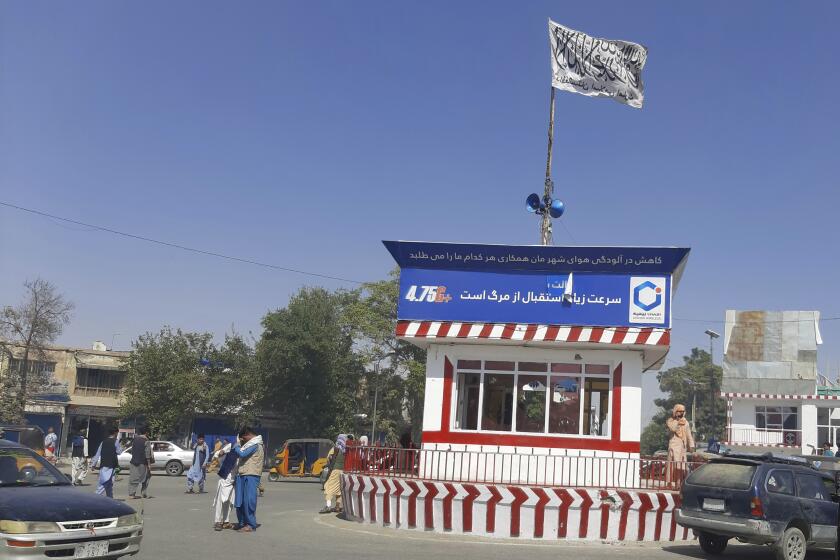Editorial: The Afghan government’s collapse is tragic. It was also inevitable

- Share via
America’s nearly 20-year war in Afghanistan came to a sudden end Sunday as Taliban fighters poured into the capital, Kabul, facing scarcely any resistance, and as the Western-backed president, Ashraf Ghani, fled the country.
The images of desperate Afghans thronging the airport in Kabul, seeking to flee the country, are harrowing. Already there are reports that Taliban fighters have imposed their severe, fundamentalist interpretation of Islam in cities they have captured — for example, insisting that women cover their hair in public and demanding that classrooms be segregated by gender.
As the Taliban captures one capital after another in Afghanistan, the familiar Beltway parlor game of who “lost” the country has begun.
Then there is the plight of tens of thousands of Afghans who worked with the United States over the years as interpreters, translators and contractors. President Biden has promised to process, transport and relocate these applicants for special immigrant visas, but events have unfolded faster than the American military’s ability to evacuate them. Many will be left behind, facing the threat of imprisonment, torture or worse. To betray these Afghans would be unconscionable.
That the Afghan government’s fall was inevitable does not make the astonishing speed of that collapse any less tragic. One generation’s worth of progress — including improvements in literacy, life span and the rights of women and girls — is now threatened to be wiped out.
The chaotic evacuation of the U.S. Embassy in Kabul and of American civilians in Afghanistan raises serious questions about the intelligence and planning that followed Biden’s decision in April to withdraw all remaining troops by the end of August — in time for the 20th anniversary of the 9/11 attacks, which triggered the U.S.-led invasion in the first place.
The U.S. must intensify its efforts to get its military personnel, civilians and Afghan allies out of the country safely and as soon as possible.
But as criticism of the Biden administration’s handling of the withdrawal grows, it is also worth taking a step back to consider how we got to this point.
Biden was fundamentally correct that keeping a small troop presence in Afghanistan — enough to hold off a Taliban takeover but not nearly enough to actually secure the country — was pointless. It would also have violated international law. The peace agreement signed by the Trump administration and the Taliban in February 2020 committed to a full U.S. troop withdrawal by May 2021; Biden had already extended that deadline once, to the end of August.
In a speech to the American people on Monday, Biden said the withdrawal was “hard and messy,” but necessary: “I stand squarely behind my decision. After 20 years, I’ve learned the hard way that there was never a good time to withdraw U.S. forces.”
And although he acknowledged that the Taliban takeover unfolded more quickly than anticipated, the easy capitulation of Afghanistan’s military and political leadership bolstered his belief that it was the right decision. “American troops cannot and should not be fighting in a war, and dying in a war, that Afghan forces are not willing to fight for themselves,” he said.
The truth is that the conflict in Afghanistan — America’s longest war — was probably lost soon after it began. After the U.S. ousted the Taliban — which had hosted the Al Qaeda terrorist network and refused to turn over terrorists such as Osama bin Laden — the George W. Bush administration expanded the goals of the mission in ways that in hindsight were never realistic. (Bin Laden was not located and killed until 2011.)
Afghanistan had not had a widely agreed-upon national government since the Soviet invasion of 1979. The U.S. and its Western allies had noble hopes to build a multiparty democracy — with respect for the rights of women and minorities, an independent judiciary and a new constitution — but nation-building was not an appropriate goal.
That does not mean that countless Afghans do not want to live in a country that is peaceful and democratic. Many — maybe most — do. But over 20 years and across four U.S. presidencies, no amount of American money and firepower could give Afghans what they needed and deserved: an honest, competent and effective government that could unify the nation, use its U.S.-backed military to defend cities and, above all, marshal the political and popular will necessary to defeat the Taliban. Ultimately, the people of Afghanistan were failed by their leaders.
The war in Afghanistan took the lives of more than 2,400 American troops. The U.S. spent $83 billion to train and equip the Afghan forces, only to see them melt away in just over a week in the face of the Taliban’s blitzkrieg. For decades to come, America will be paying the medical bills of veterans suffering from the emotional and physical toll of their trauma and injuries.
The U.S. must be vigilant in preventing Afghanistan from once again becoming a haven for jihadist terrorists; the greatest risk is that the Taliban takeover will lead to a new version of Al Qaeda or Islamic State. But keeping a small force in the country would not have eliminated that risk.
The war in Afghanistan has been ruinously costly in money and in lives. Biden made the difficult, but correct, decision not to prolong this quagmire any further. The return of the Taliban to power is a tragedy, but it is a tragedy that was decades in the making.
More to Read
A cure for the common opinion
Get thought-provoking perspectives with our weekly newsletter.
You may occasionally receive promotional content from the Los Angeles Times.











